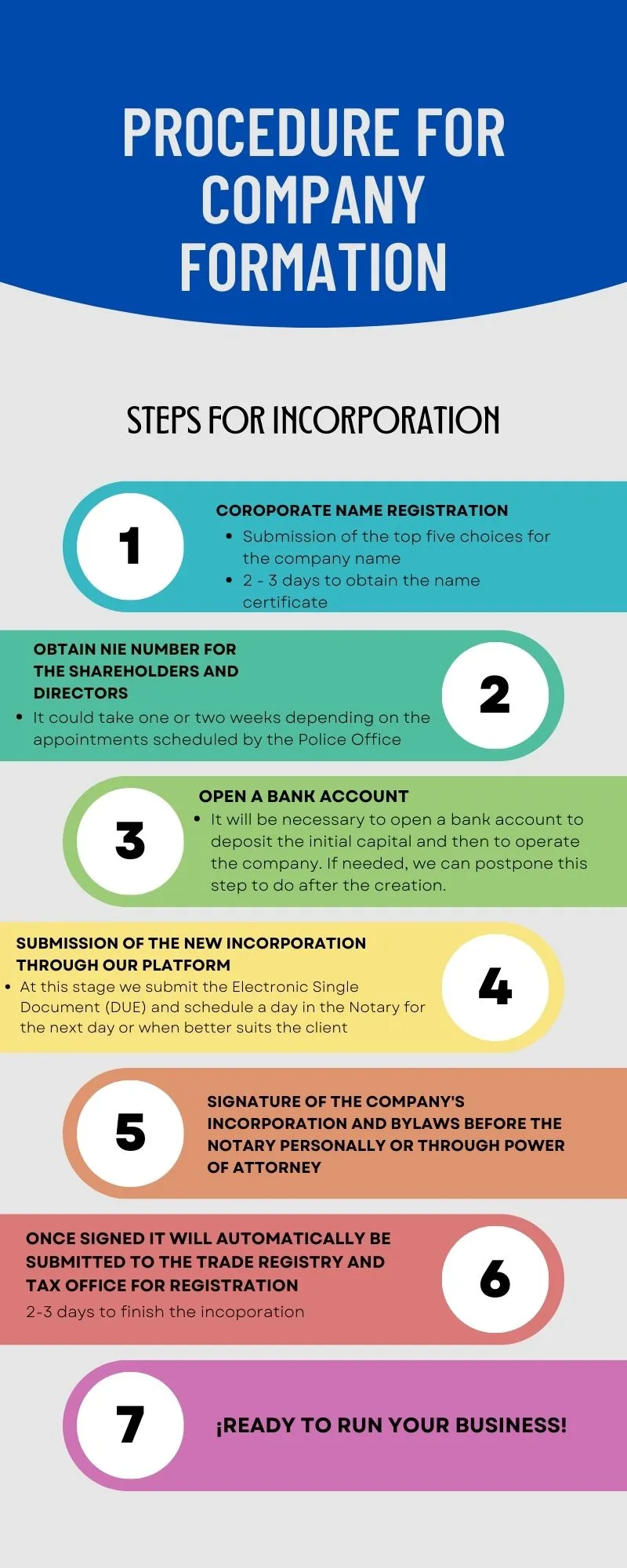How to Create a Company (SL) with an Entrepreneur Service Point

The Ultimate 2024 Company Startup Guide
How to Create a Sociedad Limitada (SL) with an Entrepreneur Service Point
Strong Abogados is here to simplify the administrative procedures and reduce bureaucratic hurdles for entrepreneurs who want to start a business. Because we are the first and only bilingual Entrepreneur Service Point in Spain, we can assist you in creating your company – simply, clearly, and fast.
Legal and practical considerations for entrepreneurs
Spain is a country that offers numerous opportunities to set up a new business. However, starting a company requires careful planning and an understanding of the legal framework involved in every step of its creation. In this article, you will find some of the key considerations that you as an entrepreneur should keep in mind when starting a business in Spain.
Sociedad Limitada: The most common legal structure
Choosing the right legal structure is one of the first steps in starting a business. The most common legal structure for companies in Spain that we mostly recommend to our clients is the limited liability company known as “Sociedad Limitada” (SL). This is mainly because:
- An SL suits small and medium businesses.
- An SL has few requirements to comply with.
- An SL is still vested with the necessary legal protection to avoid shareholders’ liability against creditors.
- An SL is more affordable.
- An SL has the advantage that you can create it via an Entrepreneur Service Point where it can be done easily and fast.
Normally the process of starting up a company is a difficult and slow task because of the laboriousness of the formalities involved, from submitting the corporate name to the Mercantile/Company Registry, writing and deciding the bylaws, coordinating and justifying the investment, financing, waiting to obtain the tax identification number (NIF), registering the business with the Commercial Registry, etc… Such a drag if you have to do it step by step. And believe me, it is much more expensive.
Entrepreneur Service Point: The solution to creating a company while avoiding bureaucracy
Fortunately, we can make it easier for you as we are the only bilingual Punto PAE (Entrepreneur Service Point) officially authorized by the Spanish government to provide every entrepreneur with information, advice, and support.
We are part of a network made up of a wide range of entities that are licensed to provide you with the assistance you need to start a business. These Services Points were launched in 2013, with the aim of simplifying administrative procedures and reducing bureaucratic hurdles for entrepreneurs.
At Strong Abogados you are going to find trained staff who are experts in the legal and administrative aspects and who can provide you with the most efficient and personalized support throughout the process of creating a company. As an official Entrepreneur Service Point provider, we are authorized to do most of the process through a single online platform (CIRCE) and therefore avoid the traditional creation procedures.
Legal requirements of incorporation
As you may know, all the paperwork needs to be officially filed to the authorities to get your S.L. fully set up and running.
To begin with, in Spain, any incorporation, in order to be regularly constituted, must be created via a public deed and registered at the Mercantile/Company Registry. Therefore it is mandatory to sign (by the shareholder/s personally or with a Power of Attorney on their behalf) before a notary who must verify that all legal requirements are fulfilled.
The Sociedad Limitada (S.L.) is regulated by the Spanish Companies Act (Ley de Sociedades de Capital) and the key requirements outlined in the law include:
- Corporate Name: Choose a unique name for your SL that isn't already registered in the Commercial Register. We will submit this name before the incorporation and if it’s not taken, we will receive a certificate in 2-3 days.
- Name of the Shareholders: You'll need at least one shareholder who can be an individual person or a legal entity. There are no restrictions on the nationality or residency of shareholders but every one of them will need to have a NIE number (See our guide on how to obtain your NIE).
- Share Capital: Since a 2022 modification to the law, the minimum share capital required is €1 (yes, one euro). In order to deposit the share capital, the SL must open a bank account that also will be needed for corporate banking activity.
- Registered Address: You must have a registered address in Spain where the SL will be headquartered. This address will serve as the official legal address of the company (See more information about our service providing a corporate address in Spain).
- Company Purpose or Economic Activity: When starting a company, it is essential to determine the activities that the company will engage in, and it is generally advisable to choose a broad range of activities (without exaggerating, of course). These activities will define the scope of operations for the company, as they represent the only permissible activities the company can legally undertake.
- Articles of Association: The online platform will create the standard Articles of Association, which will outline the company's activities, share capital, shareholder information, and the main required details. You have the option to customize the bylaws to suit your specific needs, but please be aware that this may prolong the process.
- Director: Appoint at least one director, who can be a shareholder or a third party. For the directors, there are no limitations based on nationality or residency, although a NIE number will be required.
- Tax Identification Number: On the same day we submit the application for incorporation it, a Tax Identification Number (NIF) will be automatically requested for your company from the Spanish Tax Agency (Agencia Tributaria) and the online platform will provide us with a temporary CIF number while we wait for the official document to be issued. This means you will be able to start operating just a couple of days after you sign.
- Mercantile/Company Registry: Registration of all the documentation in the Commercial Register will also be required to officially register the SL
- Accountancy: Compliance with tax laws and regulations is a critical aspect of the company’s daily operations. All businesses in Spain are subject to tax obligations and it is extremely important to comply with them in a timely manner to avoid fines and penalties. (See our section on accounting in Spain for more information).
The steps you must follow to create an SL with an Entrepreneur Service Point
By following these steps, we can register your company in Spain through our online platform in a very efficient and quick way:
What if the Shareholder will be a non-resident company?
In this case, the process will take a little longer because you need to previously register the non-resident company at the Tax Office in Spain. Here are the key steps:
- Obtain Legal Documentation: The non-resident company must obtain the necessary legal documentation to prove its legal existence and who has the authority to sign on behalf of the company. This can be fulfilled with a recently issued certificate of the commercial registry. Also if you will need a third party to sign it will be necessary for you to sign a Power of Attorney before a notary.
- Legalize and Translate Documents: In order that the foreign legal documentation is considered valid and accepted in Spain, it must be legalized by the appropriate authorities and translated into Spanish by an official translator. The legalization is commonly done with a Hague Apostille that must be stamped in the non-resident company’s home country.
- Obtain a Tax Identification Number (NIF) for the Directors: Once all the documentation is gathered it will be necessary to obtain a Tax Identification Number (NIF) from the Spanish Tax Office for each director of the non-resident company.
- Obtain the Tax Identification Number for the Non-resident company: Once we obtain the NIF for the non-resident company, we can proceed with the incorporation of the new Spanish Sociedad Limitada in the exact way we explained above.
In conclusion, establishing a Sociedad Limitada (SL) requires careful attention to legal requirements and may entail unnecessary procedural formalities. Therefore, seeking guidance from an official Entrepreneur Service Point will guarantee you a successful outcome providing you with the most efficient incorporation process and without wasting your time in bureaucratic phases. And remember, maintaining compliance with legal requirements and tax regulations is imperative to a healthy business in Spain.
Need Help?
If you need help setting up an SL in Spain, our team of lawyers at Strong Abogados is ready to assist.
